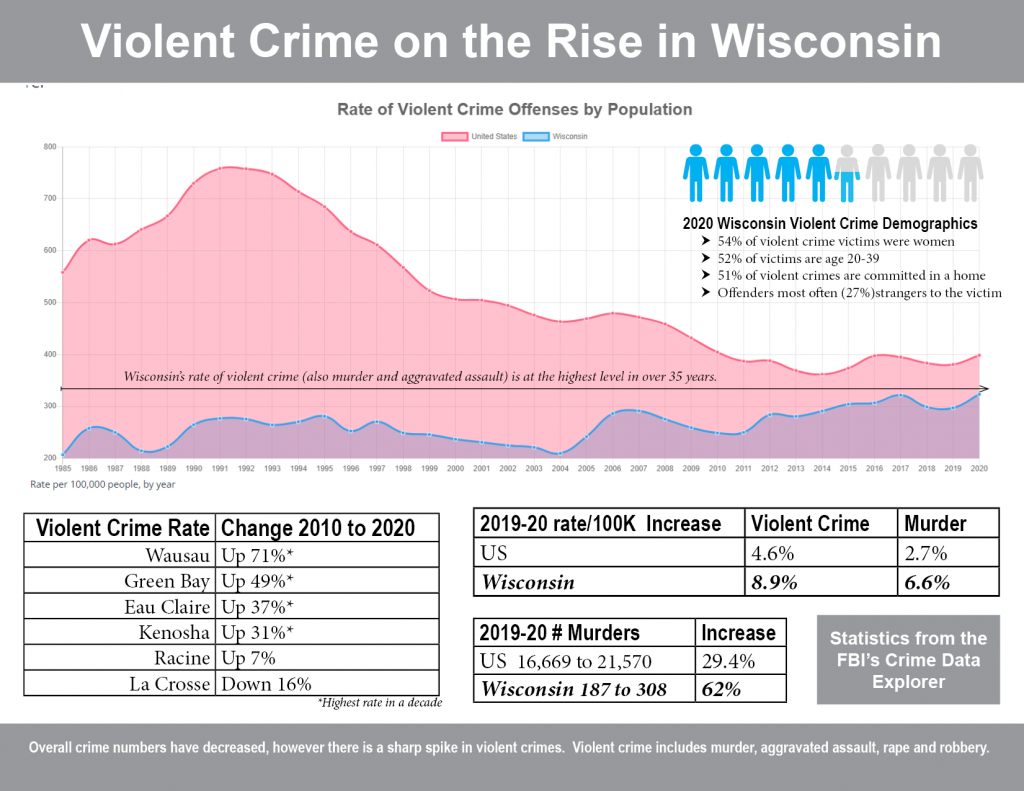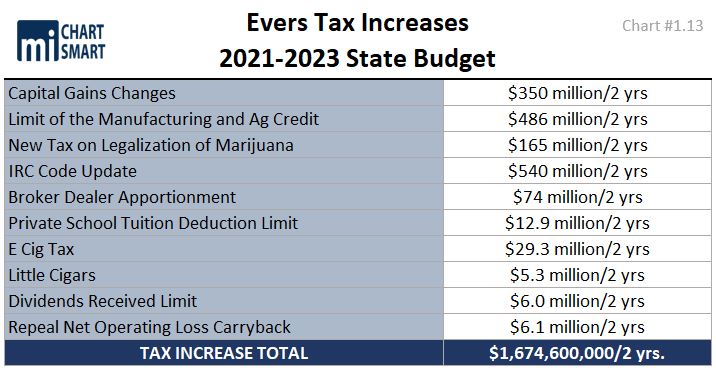
Dan O’Donnell makes the complete, irrefutable case that Tony Evers is has failed Wisconsin, with devastating consequences for its people.
Nov. 7, 2022
Perspective by Dan O’Donnell
As Wisconsin Governor Tony Evers stands for re-election, he has been desperately hoping that voters have ignored the devastation his policy failures and incompetent leadership have wrought. Wisconsin is undoubtedly worse off in the nearly four years he has led it, and he bears the lion’s share of responsibility.
Crime is up, student test scores are down, dangerous criminals are roaming the streets while hardworking men and women were locked out of their jobs for months. Unemployment checks didn’t go out on time if ever, and a state-run veterans home has become a hellhole.
On every conceivable front, Tony Evers has failed the people of Wisconsin.
Dangerous Discretionary Paroles
While running for governor four years ago, he repeatedly promised to cut Wisconsin’s prison population in half. When his opponent, then-Governor Scott Walker, labeled this a “dangerous plan” that would allow for the release of “felons who’ve committed rape, assault, robbery and even kidnapping,” Evers called him a liar.
“I never said that,” Evers said. “We will not release violent criminals.”
In fact, his administration has through discretionary parole released more than 880 violent offenders, including at least 270 murderers and attempted murderers 44 child rapists. 16 of them have already reoffended or violated the terms of their parole.
To prevent further public embarrassment, the Evers Administration has stopped following the law requiring it to inform relatives of victims of their killers’ pending releases.
Only after the family of the victim of a particularly heinous murder went to the media after Evers’ Parole Commission granted discretionary parole to her killer just 25 years into an 80-year sentence did Evers—fearing the impact on his re-election campaign—intervene and reversed the commission’s decision.
A month later, Evers demanded the resignation of Parole Commission Chairman John Tate with the hope that the move would end the controversy, but the discretionary paroles of violent offenders kept coming. On the same day Evers very publicly intervened to stop one killer’s parole, another was walking out of prison following a discretionary parole earlier in the year. Four days later, the Parole Commission granted parole to a rapist who kidnapped and assaulted a UW-Eau Claire student at knifepoint.
All told, Evers’ Parole Commission has averaged two releases per week for the first six months of this year. Despite the outrage over so many violent offenders released in such a short period of time, there is no evidence that the Evers Administration is interested in stopping. Instead, to prevent further public embarrassment it has stopped following the law requiring it to inform relatives of victims of their killers’ pending releases.
Just a month ago, the Parole Commission freed a man who shot two men to death at a YMCA in Green Bay but never told the family of one of the victims about the man’s release. The victim’s sister said she was notified of a parole hearing and sent a letter objecting to the release but was never informed that parole was granted.
The dramatic increase in discretionary paroles under Evers is a major reason that Wisconsin’s prison population has declined from 23,000 when he took office to 19,878 today. This 14 percent reduction is far short of Evers’ campaign goal, but it is also proof that he is well on his way and would almost certainly ramp up releases in his second term.
Out of Control Crime

Throwing open the prison doors through discretionary parole and, rather ridiculously, emergency release because of COVID-19 has undeniably made Wisconsin less safe. In 2018, the year before Evers took office, there were 176 murders, 2,303 rapes, 3,482 robberies, 11,337 aggravated assaults, and 8,566 car thefts.
Last year, with Evers’ crime policies in effect, the number of murders increased by 82 percent to 321, there was a two percent increase in rapes (2,359 total), aggravated assaults were up 15 percent to 13,099, and there was an astronomical 111 percent rise in car thefts to a total of 18,105. Across the state, there were an average of 50 cars stolen each day—more than two every single hour!
Milwaukee has been by far the hardest hit city in this sudden and unprecedent surge in crime. During Evers’ tenure, Milwaukee has set all-time murder records in back-to-back years and is on pace to obliterate the record this year. With almost two months left to go in 2022, Milwaukee has seen 192 murders—just five shy of the record 197 last year and two more than the 190 recorded in 2020, which was also an all-time record.
By way of comparison, Milwaukee saw just 101 homicides in 2018, its lowest total in four years. After nearly four years of Evers’ governorship, however, there has been a 95 percent increase. While there has been a national crime surge following the “Defund the Police” hysterics of mid-2020, Milwaukee has seen the fourth highest homicide rate increase in the entire country.
Nationally, homicides jumped 29.4 percent from 2019 to 2020, but in Wisconsin they were up a staggering 62 percent. Wisconsin’s 8.9 percent increase in violent crime nearly doubled the national increase of 4.6 percent.
Nationally, homicides jumped 29.4 percent from 2019 to 2020, but in Wisconsin they were up a staggering 62 percent.
What was Evers’ explanation for this? People going stir crazy. Yes, really.
“I think that as a result of the pandemic, we’ve seen lots of bad behavior as a result of people becoming stir crazy,” he said during a campaign appearance in Mosinee in September.
This, of course, nonsense. Wisconsin didn’t go more stir crazy than other states; it just had far poorer leadership. Evers in February vetoed bills from the Republican-controlled Legislature that would have funded more police officers, cracked down on criminals out on parole or probation who commit new crimes, and set new mandatory minimum sentences for repeat offenders.
He refused to use his power as governor to fire Milwaukee County District Attorney John Chisholm, whose office recommended just $1,000 bail for the Waukesha Parade killer just days before he ran his SUV through the route, killing six people (including an eight-year-old boy) and injured more than 60 others in one of the most heinous crimes in Wisconsin’s history.
And he has pushed for the release of hundreds of violent, dangerous criminals to achieve his goal of cutting the state’s prison population in half. These decisions have had deadly consequences, but Evers has refused to own up to them, so much so that he said during a television interview earlier this year that he was just too busy to visit with the families of murder victims in Milwaukee.
“I did in the Waukesha [parade attack],” he said. “I met with several of the families there. I may have before that, but I, you know, I’ve got a busy schedule.”
Fanning the Flames in Kenosha
Evers, or more likely a member of his staff, was not too busy to send an incendiary press release at the exact moment a mob was gathering in Kenosha following the officer-involved shooting of Jacob Blake in August 2020. Before any details were known—such as the fact that Blake was armed with a knife and was attempting to kidnap his children in a van stolen from a girlfriend that he had sexually assaulted two months earlier—Evers all but justified the riot that was to come.
“Tonight, Jacob Blake was shot in the back multiple times, in broad daylight, in Kenosha, Wisconsin,” his official Twitter account tweeted at 10:35 pm. “While we do not have all of the details yet, what we know for certain is that he is not the first Black man or person to have been shot or injured or mercilessly killed at the hands of individuals in law enforcement in our state or our country.”
After a summer of riots and violence following the death of George Floyd in Minneapolis, it was obvious that Kenosha was a powder keg about to explode, but Evers did not say a single word about remaining peaceful. At a press conference the following morning, as Kenosha lay in smoldering ruins and violence appeared likely for a second straight night, Evers again refused to call for peace. The closest he came was to remind rioters to “wear your mask and keep social distance as best you can.”
His and Lieutenant Governor Mandela Barnes’ rhetoric was so irresponsible that top law enforcement officials from across the state took the unprecedented step of sending an open letter to them asking them to stop making statements about the Blake shooting that are “premature, judgmental, inflammatory, and only add to the anger and divisiveness of an already dangerous situation,” adding that “a continued pattern of statements and press releases based on opinion and unsubstantiated claims puts people’s lives at risk.”
Local law enforcement in Kenosha asked for 750 National Guard troops to be deployed in the city that evening. Evers refused.
Worse than Evers’ words were his inaction, which absolutely did put people’s lives at risk. He did not call up the National Guard on the evening Jacob Blake was shot, even as it became obvious that rioting was likely as the video of the shooting went viral online and social media posts openly called for violence in Kenosha that night.
The following day, local law enforcement in Kenosha asked for 750 National Guard troops to be deployed in the city that evening. Evers refused. Only after hours of begging and very public rebukes from Republican leaders did Evers relent, agreeing to deploy just 125.
Kenosha burned for a second straight night. Law enforcement officials again begged for 750 National Guard troops, but Evers sent only an additional 125 to bring the total deployment to 250—500 fewer than what police and sheriff’s officials needed to keep the peace. President Trump offered to send in 500 federal troops to make up the difference, but Evers declined.
Kenosha burned for a third straight night, and two men were shot and killed and a third injured as they attempted to attack a teenaged boy who had driven from Illinois to help defend the city that Evers seemingly refused to. That boy, Kyle Rittenhouse, was acquitted of murder a year later when a jury determined that he acted in lawful self-defense.
The day after the shootings, Evers finally deployed the National Guard in sufficient numbers to quell the rioting and, lo and behold, Kenosha was finally able to restore order. Evers’ unconscionable dithering, however, was unforgivable. He had the power to stop the riots before they started and save his state’s fourth largest city, but he didn’t, and that may constitute the single greatest failure of leadership in Wisconsin’s history.
Unlawful COVID Lockdowns
Evers’ failure with the longest-lasting consequences, however, may well prove to be how he handled the COVID-19 pandemic. Like every other governor, Evers used an executive order to effectively shut down the state. Unlike many, though, he included in it flatly unconstitutional provisions closing churches, mosques, and synagogues and punishing protected freedom of association with jail time.
Citizens could be punished with maximum penalties of $250 and 30 days in jail for violations of Evers’ Safer at Home order, including its ban on visiting with people who do not live in the same household. This effectively criminalized families checking in on or visiting with relatives outside of their homes, thus preventing family members from associating with one another in a blatant violation of the First Amendment’s guarantee of freedom of association.
The order also arbitrarily determined which businesses were “essential” (and could thus stay open) and which were “non-essential” and had to close, thus violating the “arbitrary and capricious” standard of the Administrative Procedure Act.
Twice in the span of a year, Evers dramatically disregarded both Constitution and law and attempted to usurp legislative authority in what can only be described as an executive coup.
“Hammering home the arbitrary and capricious nature of this…is the fact that [Evers’ Department of Health Services] never bothers to explain why it is necessary to prohibit weekly religious gatherings, or limit weddings and funerals to 10 people, when daycare centers are permitted to operate with up to 50 children and 10 employees,” the Legislature noted in its lawsuit challenging the order when Evers extended it in April 2020.
The Wisconsin Supreme Court agreed, and that May struck down Evers’ extended Safer at Home order as a direct violation of rulemaking authority, an unconstitutional infringement on the Legislature’s lawmaking power, and a direct violation of the constitutional rights of the people of Wisconsin.
Yet Evers still persisted in violating the Constitution and Rule of Law by declaring new public health emergencies every two months solely so that he could keep a statewide mask mandate in effect. In early July 2020, Evers insisted that he did not have the authority to declare a statewide mask mandate without the approval of the Legislature, but said that a prominent business leader urged him to “just do it anyway.”
He did, declaring a new public health emergency later that month and using his emergency powers to impose a mask mandate. As long as there was an emergency in effect, he reasoned, he could keep the mandate going and when each public health emergency would expire after 60 days, he would simply declare a new emergency so that he could issue a new mandate.
Nothing about the pandemic changed, of course. There was nothing more serious or novel about COVID-19 in January 2021 that didn’t exist when the original public health emergency was declared in March 2020; Evers was simply getting around the legal checks on his power by declaring new emergencies to get his preferred policy in place.
The Legislature again sued him and again the Wisconsin Supreme Court struck down his unconstitutional shell game. Twice in the span of a year, Evers dramatically disregarded both Constitution and law and attempted to usurp legislative authority in what can only be described as an executive coup. This wasn’t just a failure; it was a chilling tendency toward authoritarian governance.
Schoolchildren Suffer
Even though much of Wisconsin reopened following the end of Safer at Home, many public schools did not, especially in the largest and most at-risk districts. Milwaukee and Madison, for instance, didn’t open their doors until students had been locked out for more than a year. Evers, the former state superintendent who fashioned himself “the education governor,” never once demanded a reopening.
Declining proficiency in Wisconsin has also been a long-term trend, dating back to—not coincidentally—2001, when Evers first became State Superintendent.
The results were devastating. The Nation’s Report Card, released last month, revealed that Wisconsin has the largest racial achievement gap in the entire country. Fourth and eighth grade reading and math scores dropped significantly among all students. Wisconsin’s fourth graders scored a 217 in reading on a test in which 238 is considered proficient or at grade levels. Eighth graders scored a 262 when 281 is considered proficient. Fourth graders scored a 240 in math while eighth graders scored 281 when scores of 249 and 299 are, respectively, considered proficient.
A month earlier, standardized test scores from Wisconsin’s Department of Public Instruction showed that fewer than half of the state’s third through eighth graders are proficient in math and language arts, a sizable 10 percent drop from 2019, when Evers first took office. Just 39 percent of students are now at grade level in math and 37 are considered proficient in language arts.
Naturally, the Evers Administration blamed the pandemic, but this is obfuscation. It was the response to the pandemic—closing schools and keeping them closed—that exacerbated the learning loss that may never be recovered.
Declining proficiency in Wisconsin has also been a long-term trend, dating back to—not coincidentally—2001, when Evers first became State Superintendent. As both the head of the Department of Public Instruction and as governor, the data is clear: Tony Evers has failed Wisconsin’s schoolchildren.
Budget Busting Tax Increase Proposals
He has blamed the State Legislature for this failure for refusing to, in his words, adequately fund public schools, but state support for education has dramatically increased over the past decade even as scores have consistently declined. Clearly, more funding does not equate to better results in the classroom.
Nevertheless, Evers clung to this canard as he threatened to veto the Republican-authored biennial budget last year because it didn’t spend enough on public education…even though it spent a record $17.9 billion on schools.
In his 2019-2021 budget, Evers proposed more than $1 billion in new taxes to go along with a massive increase in government spending.
For a second straight biennium, the Legislature saved Evers from himself (and saved taxpayers from the devastating tax increases that Evers proposed). In his 2019-2021 budget, he proposed more than $1 billion in new taxes to go along with a massive increase in government spending. The Legislature simply tossed his budget and wrote its own, which Evers groused about for months but eventually signed with only minor vetoes.
He also proposed an eight-cent increase in Wisconsin’s gas tax and a plan that would tie future gas tax increases to the rate of inflation. This would have been a nightmare, as year-over-year inflation hit an all-time record of 9.1 percent in June and has not dipped below eight percent since.
Last year, Evers in his 2021-2023 budget proposed a record tax increase of well over $1 billion and spending increases of more than $8 billion. The Legislature once again ignored this budget and wrote its own, which included record tax cuts. Evers once again threatened to veto the entire thing but, recognizing how politically dangerous it would be to veto such a massive tax cut a little more than a year before he stood for re-election, signed it into law and then gallingly took credit for Republicans’ work.
How, an incredulous reporter asked him, could he do that when it was obviously a Republican budget and not his?
“Well,” Evers answered. “I could have vetoed that.”


Unemployment Insurance Nightmares
Just as Evers has been a disaster on policy, he has been utterly incompetent in performing the most basic functions of state government. After Evers shut down the state and put hundreds of thousands of so-called “non-essential” employees out of work, his administration’s ineptitude denied them badly needed federal unemployment benefits.
An audit revealed that in the early days of COVID-19, when people were unable to work and dependent upon the government for a paycheck, more than 99 percent of all phone calls to Wisconsin’s unemployment office went unanswered. The state’s unemployment benefits website was all but unusable.
The backlog hit 800,000 claims by August 2020, and people waited months to get their money. Some never did.
More than half of all unemployment claims went unprocessed within eight weeks in 2020, a stunning number considering more than 400,000 people suddenly found themselves unemployed. The backlog hit 800,000 claims by August 2020, and people waited months to get their money. Some never did.
Evers responded by doing little to fix the underlying problems but making a big show of firing Department of Workforce Development Secretary Caleb Frostman. Nothing much changed. Even after the state reopened and people started to go back to work, thus easing the massive strain on the unemployment claims processing system, 25 percent of claims still were unprocessed within eight weeks in 2021.
Even now, with the state fully reopened and the unemployment rate down to pre-pandemic levels, seven percent of claims have not been processed within eight weeks in 2022.
A Veterans Home Hellhole
It is the most basic duty of government to protect its citizens from harm, and in this the Evers Administration has failed spectacularly.
In May, the Milwaukee Journal Sentinel reported that a terrifying pattern of abuse and neglect was killing residents of the state-run veterans home in Union Grove. On Evers’ watch, the facility became “one of the most troubled state-run veterans homes in the nation.”
Six months after the stunning revelation came to light, Evers has not done a thing to remedy the care provided in Union Grove.
“Union Grove ranked in the top five out of 117 CMS-certified state veterans facilities for having the most violations and fines, the analysis found,” the Journal Sentinel noted. “In the past five years, Union Grove was cited for 62 violations and received fines totaling $250,000.
“One of three veterans homes operated by the Wisconsin Department of Veterans Affairs, Union Grove had more violations than the state’s two other veterans homes — King and Chippewa Falls — combined.”
Those violations included “failing to keep residents hydrated, not investigating patient abuse, infection control issues, medication mistakes, poor food and not doing enough to keep residents from falling. Residents and family members said care has declined as leadership frequently changed and the home struggles with chronic understaffing.”
Six months after the stunning revelation came to light, Evers has not done a thing to remedy the care provided in Union Grove, and its yearly inspection yielded six new violations, including what the Journal Sentinel described as “several repeats of recurring issues.”
Evers has not demanded any resignations or any semblance of accountability, and as a result, Wisconsin’s most vulnerable veterans continue to be at risk.
A Failed Governor
Such feckless leadership has been a hallmark of Evers’ tenure, which has been perhaps the most disastrous in Wisconsin’s history.
Never before has a governor simultaneously made a state less safe through a concerted effort to throw open the prison doors, openly incited rioting and then failed to act to save a city from burning to the ground, grossly violated the Constitution and Rule of Law by abusing his emergency power, and governed so ineptly that his constituents have been wholly unable to receive the most basic level of services from state government.
On every possible front, Tony Evers has failed Wisconsin and it has had devastating, life-changing consequences for its people.

